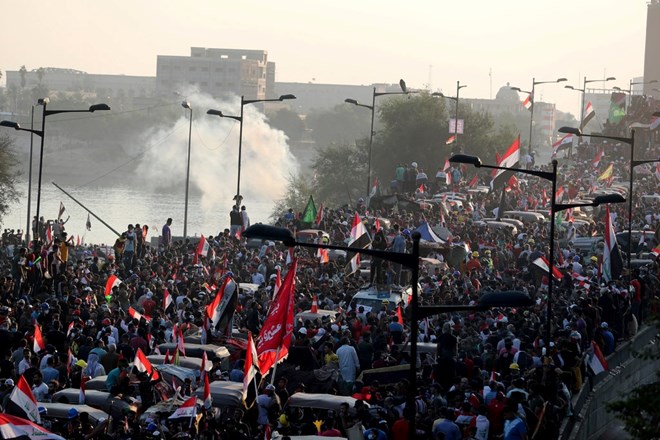
Saturday November 2, 2019
By Alissa J. Rubin

The demonstration in Baghdad on Friday was the largest in a month’s worth of protests.Credit...Khalid Mohammed/Associated Press
BAGHDAD — Tens of thousands of Iraqis, with support from Shiite religious authorities and the country’s president, gathered in the center of the capital on Friday in the largest of a month’s worth of antigovernment protests.
Two demonstrators were killed, but pronouncements from religious and political leaders appear to have staved off a repeat of the violence of the early days of the demonstrations, when security forces killed nearly 150 protesters.
The religious authorities said Friday that the government should protect peaceful protesters who have called for an end to corruption and a change in leadership, a message that was echoed by President Barham Salih.
Although casualties were down and the security forces appear to have exercised restraint, the respite rests on a knife’s edge.
Behind the scenes, the security forces and civilian officials have discussed almost daily whether to use force to oust protesters from the Jumhuriya Bridge, which spans the Tigris River and leads to the Green Zone, a government and diplomatic center.
So far they have not, in order to avoid a repeat of the deadly, early-October violence that transformed what were initially small antigovernment protests into a nationwide movement. In addition to the deaths, thousands of protesters were wounded.
Parliament and government officials are discussing ways to meet at least some of the protesters’ demands, and Mr. Salih seemed to put himself squarely on the side of the demonstrators.
“The status quo is unsustainable. We are in need of big changes,” Mr. Salih said.
“There is no security solution,” he added. “We reject repression and the use of force and violence. The solution is in reforms.”
Mr. Salih has proposed discarding the current electoral system, in which voters cast ballots for a list of candidates belonging to a particular political party. Instead, under his plan, they would vote for representatives by district, a move intended to make members of Parliament more accountable to constituents and to reduce the influence of the political parties.
Mr. Salih also said that Prime Minister Adel Abdul Mahdi would resign, but only after the parties anoint a successor to avoid a power vacuum.
Opposition politicians and many protesters have called on Mr. Mahdi to resign, prompting him to offer to step down in a letter this week to the Shiite cleric Moktada al-Sadr, who has been encouraging the protests.
The president’s repetition of Mr. Mahdi’s intentions seemed aimed at reassuring Iraqis that the offer was genuine. “The prime minister has expressed his willingness to submit his resignation, asking the political blocs to reach an acceptable alternative,” Mr. Salih said.
Both the United States and Iran have weighed in on the protests, signaling that they view calm in Iraq as a priority. But while the United States has sided with the demonstrators, Iran has charged that the unrest has been fomented by Israel and the United States.
One of the victims on Friday, the first woman to lose her life in the demonstrations, was hit on the head by a tear-gas canister.
The tear gas used by Iraqi security forces is delivered in metal canisters that function like grenades, causing “gruesome wounds and death after the grenade embeds in the skull,” Amnesty International said in a report this week.
“The tear gas is not being used as a dispersal mechanism,” added Belkis Wille, the senior Iraq researcher for Human Rights Watch. “It’s being used in lieu of live ammunition.”